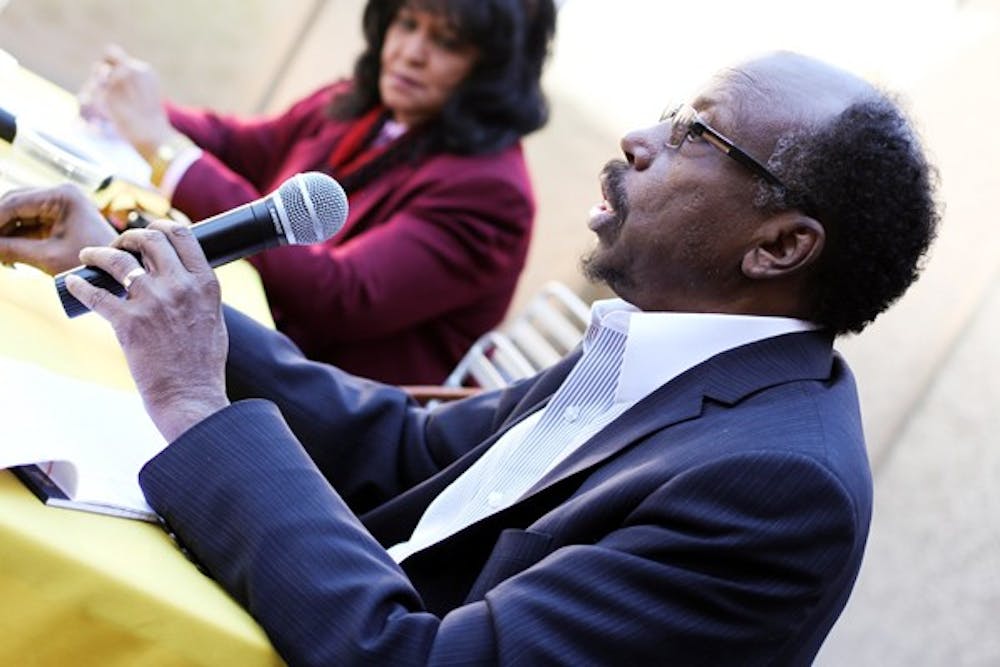Approximately 35 people gathered Wednesday afternoon outside Fair Trade Café near the Downtown campus to discuss the Arab Spring, a period of political turmoil in Middle Eastern and African countries beginning in December 2010.
Professors Souad Ali of the School of International Letters and Cultures and Abdullahi Gallab of the School of Social Transformation both gave speeches, which were followed by a question-and-answer session.
The event is part of The New York Times Café discussion series, made possible through a partnership between The New York Times in College program, the School of Letters and Sciences and the Undergraduate Student Government Downtown.
The Downtown student government also sponsors the distribution of the Times on the Downtown campus every weekday.
USGD Director of Parliamentary Procedures Andres Cano said the topic was chosen a few weeks ago, around the time Libyan dictator Moammar Gadhafi died after being captured by Libya’s rebel army.
“The Arab Spring has been widely seen as an event that has irrevocably changed the region,” Ali said.
Ali went through the Arab Springs’ timeline of events beginning with the self-immolation of Tunisian resident Mohamed Bouazizi.
Ali said the movement began in Tunisia because although the country has a comfortable middle class, it has few job prospects for young workers. Bouazizi was among these workers; he sold produce from a cart, which was tipped over by police officers before he chose to take his own life.
Bouazizi’s dramatic suicide in December 2010 led to protests and riots in Tunisia, eventually causing then-president Zine El Abidine Ben Ali to leave the country. It also inspired copycat self-immolations after similar protests in other Arab countries.
Souad Ali discussed the effects of the Arab Spring in other countries, most notably the revolution in Egypt and civil war in Libya.
Ali said in addition to the civil clashes within countries, the Arab Spring has sparked additional fighting between the Palestinians and Israelis along the Gaza Strip.
Ali also said production in the countries that have succeeded with revolutions has gone down, and countries such as Saudi Arabia — those already wealthy from oil exports — will remain unchanged by the protests.
Ali said perhaps the greatest impact of the Arab Spring is its effect on al-Qaida.
“The Arab Spring exposed al-Qaida as ineffective in political change,” Ali said.
Gallab chose to focus on the media’s role in the Arab Spring.
“We are watching the hour of the citizen,” Gallab said. “We are talking about the history of the present.”
Gallab described the different types of media within Arab countries, such as the state-owned media, Arab-language news outlets in Western countries and the social media that has allowed citizens to become reporters.
“Social media is a system created by globalization that acts together to provide a minute-by-minute account,” Gallab said.
He explained that demonstrations have happened before in the Arab world, but social media has prevented regimes from hiding it.
Social work graduate student Bryan Younger helps train refugees from Arab countries for jobs in the U.S.
“I came because I thought this was very relevant to me,” Younger said of Wednesday’s discussion. “It was relevant, but a little bit short.”
USGD plans to hold two more of these discussions — one in February and another in April.
“Today's discussion showed that students do care about global issues,” Cano said in an email. “This will without a doubt be a reoccurring event on the Downtown campus.”
Reach the reporter at julia.shumway@asu.edu or follow @JMShumway on Twitter.
Like The State Press on Facebook and follow @statepress on Twitter.




